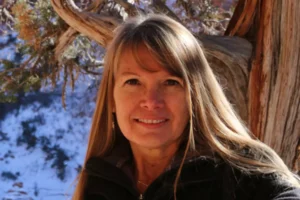“My grandfather just died.” ZsófiNames changed for sensitivity dropped her head for a moment before continuing. “It’s been draining, depressing at times. Death feels so cold and final. I had to talk about it with someone — it’s just so painful.”
Elizabeth’s heart raced. She had met Zsófi only two months earlier on the metro. They soon discovered they had something in common: Each wanted to learn the other’s language. Elizabeth was studying Hungarian, and Zsófi English. They had exchanged a few e-mails, but Elizabeth doubted she would ever hear from her again.
Elizabeth had been praying that God would help her make contacts with people to share the message of Jesus, but all her efforts had come to naught. To her surprise, she received an email from Zsófi the next day. They began to get together, and one time Elizabeth invited her to church — but Zsófi, a Hungarian Jew, wanted nothing to do with Christianity.
The two young women continued to hang out, but Elizabeth had given up hope of finding an opportunity to share the Gospel. One night Zsófi came to Elizabeth’s apartment for dinner, and after two hours talking about travel, pictures, boys, and family, Zsófi brought up her grandfather’s death.
“It’s just so painful,” Zsófi mumbled. “Sometimes I don’t know how to deal with the heartache.”
Elizabeth reached for Zsófi’s hand. “I can’t understand the pain you’re going through. But I do understand the pain of losing someone.”
“What do you mean?” Zsófi looked up at her.
Elizabeth sat back. “I was not even a teenager when my brother, one year younger than me, died of brain cancer. I had watched him endure needles upon needles, treatment upon treatment for two years, until he finally succumbed to the disease that ruled his body.” She paused. “But I believe I’m going to see my brother again.”
“What!” Zsófi crossed her arms and leaned on the table. “How?”
“Because of Jesus Christ, a man who lived a perfect life, died a death in my place, and rose up from the dead to conquer sin and death.” Elizabeth explained what Jesus had done and told her story of coming to faith in Christ. “Because of my faith in Jesus, I believe I will see my brother again and will live forever with God.”
Zsófi reclined her chair backwards. “It must be easier for you to deal with death because you have faith.”
Though Zsófi did not place her faith in Christ that night, she did not reject Elizabeth either. They still get together often and continue talking about life, even weighty issues like death and God. At an unexpected time, when Elizabeth had thought the door to spiritual issues was closed in this relationship, God opened the door. And Elizabeth prays that Zsófi will someday soon open the door of her heart completely to Christ.
Elizabeth’s encounter with Zsófi reminds us that evangelism is not a science. There are numerous methods that can help get us started, but no single method “works” in every situation. On the contrary, the very nature of telling the message of Jesus Christ to people requires sensitivity, discernment, and variation in style.
But Elizabeth’s story illustrates a healthy approach to evangelism that, I believe, reflects biblical teachings.
The Role of the Holy Spirit. One thing every Christian must acknowledge up front is that we, as humans, are unable to save anyone. Salvation from sin and death comes only through Jesus Christ, since “there is salvation in no one else, for there is no other name under heaven given among men by which we must be saved” (Acts 4:12).
And before anyone brags about the number of people he or she has led to faith in Christ, we must remind ourselves that “no one can come to [Christ] unless the Father who sent [Him] draws him” (John 6:44). The Father may use us as His instruments, but only God convicts and gives the faith for others to believe (1 Cor 3:5-7). John 16:7-11 identifies the Holy Spirit, not us, as the One Who convicts the world.
This was a formational idea in Elizabeth’s approach. She stopped trying to force relationships and let the Spirit bring into her life the relationships He wanted. While Elizabeth had previously tried to build relationships, unsuccessfully, God brought Zsófi into her life in His timing.
And when Elizabeth had given up talking about spiritual issues, Zsófi brought them up, asking the questions when she wanted to. We can’t control receptivity to the gospel, but the Spirit opens hearts and orchestrates discussions according to His perfect will.
The Reliance on Prayer. The reality that God in His sovereignty draws people to Himself in His time and arranges our relationships according to His divine plan should cause us to throw ourselves in dependence upon Him. Prayer is our expression of reliance on God for effectiveness in sharing the message of Jesus Christ (John 14:14; Eph 6:18).
Elizabeth didn’t force a discussion of spiritual things on Zsófi, but she did pray that God would give her an opportunity to share her testimony. She prayed that the Spirit would bring people into her life who needed to hear about Jesus’ love and grace. And the Spirit did just that in His time; the spiritual topic arose naturally, rather than forcefully.
Recognizing the Spirit’s role in evangelism of convicting people should cause us to pray ever more fervently that He might work in our relationships (e.g., 2 Thess 3:1). Lewis Sperry Chafer portrays our prayer role in stark terms: “Fundamentally, then, the personal element in true soul-winning work is more a service of pleading for souls than a service of pleading with souls. It is talking with God about men [and women] from a clean heart and in the power of the Spirit, rather than talking to men [and women] about God.”Lewis Sperry Chafer, True Evangelism (Grand Rapids: Kregel, 1993), 69.
Quite practically, then, we can begin evangelistic work by praying for a few people we know, asking the Spirit to convict them and guide them to faith in Christ.
The Need to Tell People the Gospel. At some point, however, we must be prepared to share the gospel. As a Christian praying for the salvation of others, we must recognize that God may use us to proclaim the good news.
We have been given the Great Commission (Matt 28:18-20), which requires that we tell others about the love of Christ. Romans 10:14 makes it clear that people must hear the gospel before they can believe it. It must be communicated at some point because that’s what loving friends do — they tell the truth with a gracious voice.
The Complex Process of Discipleship. Matthew 28:18-20 records the Great Commission, where Jesus said:
All authority has been given to Me in heaven and on earth. Go therefore and make disciples of all the nations, baptizing them in the name of the Father and the Son and the Holy Spirit, teaching them to observe all that I commanded you; and lo, I am with you always, even to the end of the age.
This passage has oft been quoted as the missions passage that calls us to evangelize the world. But Jesus isn’t interested in us just preaching the gospel; He commands us to “make disciples of all nations.” Our evangelistic task is never finished when someone prays a prayer or walks an aisle. Jesus charges us not only to introduce people to His grace, but to help them grow in Christ.
Granted, no one individual can complete this task by herself. But too often, we celebrate someone who confesses faith in Christ and stop there.
Evangelism is all about love — loving a person enough to share the message of Jesus Christ with him and loving him enough to teach him the commands of Jesus, the truths of Scripture, the walk of faith. Loving him enough to disciple him. It is the responsibility of the Church by the Spirit to guide people from pre-Christian life toward maturity in Christ, but it is our individual responsibility to make sure we connect people to the church and to God’s truth.
The Preeminence of Love. Evangelism is not about how many people I have led to Christ. It is about seeing people as God sees them. God the Son loved people to the point of death, and we need to see people through God’s eyes — desperate, lost, and heading for a judgment they deserve. That’s exactly what we were (1 Cor 6:9-11). But we were saved by God’s amazing grace, and when we see people in their lost state, our love for them motivates our message.
Loving Zsófi is exactly what Elizabeth did. She didn’t try to convert her; she loved her. And out of her love came a divinely instituted opportunity to share Christ with her. Out of her love, Zsófi may one day find peace with God.
In the end, evangelism is not about numbers; it’s about loving people so they can know the love of God and believe in Jesus Christ. Evangelism is not counting converts. It’s praying for and loving the people the Spirit brings into our lives, loving them with the message of Christ’s grace and with the commitment to walk with them to maturity. Evangelism is taking love next door.
Copyright 2006 David Barshinger. All rights reserved. Int










